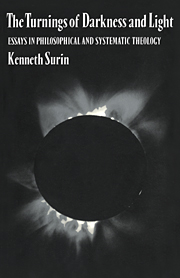Book contents
- Frontmatter
- Contents
- Dedication
- Preface
- Abbreviations
- 1 Creation, revelation and the analogy theory
- 2 The Trinity and philosophical reflection: a study of David Brown's The Divine Trinity
- 3 ‘Is it true what they say about “theological realism”?’
- 4 The impassibility of God and the problem of evil
- 5 Theodicy?
- 6 Tragedy and the soul's conquest of evil
- 7 Atonement and moral apocalypticism: William Styron's Sophie's Choice
- 8 Atonement and christology
- 9 Revelation, salvation, the uniqueness of Christ and other religions
- 10 ‘Many religions and the one true faith’: an examination of Lindbeck's chapter 3
- 11 Contemptus mundi and the disenchanted world: Bonhoeffer's ‘discipline of the secret’ and Adorno's ‘strategy of hibernation’
- 12 ‘The weight of weakness’: intratextuality and discipleship
- 13 ‘Theistic arguments’ and ‘rational theism’
- Notes
- Index of names
- Index of subjects
8 - Atonement and christology
Published online by Cambridge University Press: 19 January 2010
- Frontmatter
- Contents
- Dedication
- Preface
- Abbreviations
- 1 Creation, revelation and the analogy theory
- 2 The Trinity and philosophical reflection: a study of David Brown's The Divine Trinity
- 3 ‘Is it true what they say about “theological realism”?’
- 4 The impassibility of God and the problem of evil
- 5 Theodicy?
- 6 Tragedy and the soul's conquest of evil
- 7 Atonement and moral apocalypticism: William Styron's Sophie's Choice
- 8 Atonement and christology
- 9 Revelation, salvation, the uniqueness of Christ and other religions
- 10 ‘Many religions and the one true faith’: an examination of Lindbeck's chapter 3
- 11 Contemptus mundi and the disenchanted world: Bonhoeffer's ‘discipline of the secret’ and Adorno's ‘strategy of hibernation’
- 12 ‘The weight of weakness’: intratextuality and discipleship
- 13 ‘Theistic arguments’ and ‘rational theism’
- Notes
- Index of names
- Index of subjects
Summary
One of the more important issues raised in the debate connected with The Myth of God Incarnate concerns the relation soteriology has to the incarnation. Is the Christian understanding of salvation, as traditionally formulated in the doctrine of the atonement, inextricably bound up with the incarnation? If it is, do we necessarily have to reject the doctrine of the atonement if we think there are adequate grounds for questioning the tenability of the notion of the incarnation? Or can we at least retain the fundamental insights of the atonement by modifying our understanding of the incarnation, perhaps by opting for a ‘functional’, as opposed to an ‘ontological’, christology? In any case, the doctrine of the atonement and the christological question cannot be discussed in isolation from each other. Our interest in the relation soteriology has to christology may also be heightened by the fact that in recent years particularly impressive ‘functional’ christologies have been developed by Geoffrey Lampe and Edward Schillebeeckx. Our preference for one or the other type of christology may be determined, in part, by our basic theological approach. As Stephen Sykes, following J. F. Bethune-Baker, has pointed out, there are two basic approaches, with different starting-points: ‘The anthropological approach defines man and his needs and finds in Christ a saviour…. The other approach is theological, which starts with God and his sovereign activity. Christology is possible because God has acted. Man is saved because God acted to save him.’
- Type
- Chapter
- Information
- The Turnings of Darkness and LightEssays in Philosophical and Systematic Theology, pp. 117 - 135Publisher: Cambridge University PressPrint publication year: 1989

